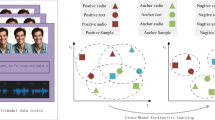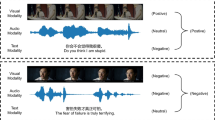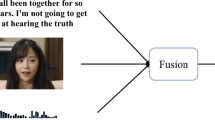Abstract
Multimodal sentiment analysis (MSA) is dedicated to deciphering human emotions in videos. It is a challenging task due to the semantic disparities among various modalities (e.g., linguistic, visual, and acoustic) present in video content. To bridge these gaps, we leverage contrastive learning and introduce a novel hierarchical multimodal approach termed Hierarchical Supervised Contrastive Learning (HSCL). Initially, we utilize an unimodal fusion combined with a supervised contrastive learning strategy to distill pertinent content from each modality. Subsequently, we combine the bimodal data in pairs and further align them through supervised contrastive learning. This paired data aids in understanding the intricate nuances of multidimensional human emotions. In our method, supervised contrastive learning is tailored to accentuate the significance of label information, facilitating the extraction of sentiment cues from diverse sources. Experimental studies on two benchmark datasets demonstrate the effectiveness of our method. Specifically, compared to the baseline on the CMU-MOSI benchmark, our method achieves 2.59% accuracy improvement for emotion recognition. Codes are released at https://github.com/Turdidae810/HSCL.
Access this chapter
Tax calculation will be finalised at checkout
Purchases are for personal use only
Similar content being viewed by others
References
Ba, J.L., Kiros, J.R., Hinton, G.E.: Layer normalization. arXiv preprint arXiv:1607.06450 (2016)
Baltrušaitis, T., Robinson, P., Morency, L.P.: Openface: an open source facial behavior analysis toolkit. In: 2016 IEEE Winter Conference on Applications of Computer Vision (WACV), pp. 1–10. IEEE (2016)
Chen, T., Kornblith, S., Norouzi, M., Hinton, G.: A simple framework for contrastive learning of visual representations. In: International Conference on Machine Learning, pp. 1597–1607. PMLR (2020)
Degottex, G., Kane, J., Drugman, T., Raitio, T., Scherer, S.: Covarep-a collaborative voice analysis repository for speech technologies. In: 2014 IEEE International Conference on Acoustics, Speech and Signal Processing (ICASSP), pp. 960–964. IEEE (2014)
Gao, T., Yao, X., Chen, D.: SimCSE: simple contrastive learning of sentence embeddings. In: Proceedings of the 2021 Conference on Empirical Methods in Natural Language Processing, pp. 6894–6910 (2021)
Han, W., Chen, H., Gelbukh, A., Zadeh, A., Morency, L.P., Poria, S.: Bi-bimodal modality fusion for correlation-controlled multimodal sentiment analysis. In: Proceedings of the 2021 International Conference on Multimodal Interaction, pp. 6–15 (2021)
Han, W., Chen, H., Poria, S.: Improving multimodal fusion with hierarchical mutual information maximization for multimodal sentiment analysis. In: Proceedings of the 2021 Conference on Empirical Methods in Natural Language Processing, pp. 9180–9192 (2021)
Hazarika, D., Zimmermann, R., Poria, S.: Misa: modality-invariant and-specific representations for multimodal sentiment analysis. In: Proceedings of the 28th ACM International Conference on Multimedia, pp. 1122–1131 (2020)
He, K., Zhang, X., Ren, S., Sun, J.: Deep residual learning for image recognition. In: Proceedings of the IEEE Conference on Computer Vision and Pattern Recognition, pp. 770–778 (2016)
Hochreiter, S., Schmidhuber, J.: Long short-term memory. Neural Comput. 9(8), 1735–1780 (1997)
Kenton, J.D.M.W.C., Toutanova, L.K.: BERT: pre-training of deep bidirectional transformers for language understanding. In: Proceedings of NAACL-HLT, vol. 1, p. 2 (2019)
Khosla, P., et al.: Supervised contrastive learning. In: Advances in Neural Information Processing Systems, vol. 33, pp. 18661–18673 (2020)
Kingma, D.P., Ba, J.: Adam: a method for stochastic optimization. arXiv preprint arXiv:1412.6980 (2014)
Li, J., Selvaraju, R., Gotmare, A., Joty, S., Xiong, C., Hoi, S.C.H.: Align before fuse: vision and language representation learning with momentum distillation. In: Advances in Neural Information Processing Systems, vol. 34, pp. 9694–9705 (2021)
Li, Y., Wang, Y., Cui, Z.: Decoupled multimodal distilling for emotion recognition. In: Proceedings of the IEEE/CVF Conference on Computer Vision and Pattern Recognition, pp. 6631–6640 (2023)
Lin, Z., et al.: Modeling intra-and inter-modal relations: hierarchical graph contrastive learning for multimodal sentiment analysis. In: Proceedings of the 29th International Conference on Computational Linguistics, pp. 7124–7135 (2022)
Pang, B., Lee, L., Vaithyanathan, S.: Thumbs up? Sentiment classification using machine learning techniques. In: Proceedings of the 2002 Conference on Empirical Methods in Natural Language Processing (EMNLP 2002), pp. 79–86 (2002)
Pérez-Rosas, V., Mihalcea, R., Morency, L.P.: Utterance-level multimodal sentiment analysis. In: Proceedings of the 51st Annual Meeting of the Association for Computational Linguistics (Volume 1: Long Papers), pp. 973–982 (2013)
Radford, A., et al.: Learning transferable visual models from natural language supervision. In: International Conference on Machine Learning, pp. 8748–8763. PMLR (2021)
Rahman, W., et al.: Integrating multimodal information in large pretrained transformers. In: Proceedings of the Conference. Association for Computational Linguistics. Meeting, vol. 2020, p. 2359. NIH Public Access (2020)
Sun, H., Wang, H., Liu, J., Chen, Y.W., Lin, L.: CubeMLP: an MLP-based model for multimodal sentiment analysis and depression estimation. In: Proceedings of the 30th ACM International Conference on Multimedia, pp. 3722–3729 (2022)
Sun, Z., Sarma, P., Sethares, W., Liang, Y.: Learning relationships between text, audio, and video via deep canonical correlation for multimodal language analysis. In: Proceedings of the AAAI Conference on Artificial Intelligence, vol. 34, pp. 8992–8999 (2020)
Tsai, Y.H.H., Bai, S., Liang, P.P., Kolter, J.Z., Morency, L.P., Salakhutdinov, R.: Multimodal transformer for unaligned multimodal language sequences. In: Proceedings of the 57th Annual Meeting of the Association for Computational Linguistics, pp. 6558–6569 (2019)
Tsai, Y.H.H., Liang, P.P., Zadeh, A., Morency, L.P., Salakhutdinov, R.: Learning factorized multimodal representations. In: International Conference on Learning Representations (2018)
Vaswani, A., et al.: Attention is all you need. In: Advances in Neural Information Processing Systems, vol. 30 (2017)
Yu, W., Xu, H., Yuan, Z., Wu, J.: Learning modality-specific representations with self-supervised multi-task learning for multimodal sentiment analysis. In: Proceedings of the AAAI Conference on Artificial Intelligence, vol. 35, pp. 10790–10797 (2021)
Zadeh, A., Chen, M., Poria, S., Cambria, E., Morency, L.P.: Tensor fusion network for multimodal sentiment analysis. In: Proceedings of the 2017 Conference on Empirical Methods in Natural Language Processing, pp. 1103–1114 (2017)
Zadeh, A., Zellers, R., Pincus, E., Morency, L.P.: Multimodal sentiment intensity analysis in videos: facial gestures and verbal messages. IEEE Intell. Syst. 31(6), 82–88 (2016)
Zadeh, A.B., Liang, P.P., Poria, S., Cambria, E., Morency, L.P.: Multimodal language analysis in the wild: CMU-MOSEI dataset and interpretable dynamic fusion graph. In: Proceedings of the 56th Annual Meeting of the Association for Computational Linguistics (Volume 1: Long Papers), pp. 2236–2246 (2018)
Zha, K., Cao, P., Yang, Y., Katabi, D.: Supervised contrastive regression. arXiv preprint arXiv:2210.01189 (2022)
Zhang, L., Wang, S., Liu, B.: Deep learning for sentiment analysis: a survey. Wiley Interdiscip. Rev. Data Min. Knowl. Discov. 8(4), e1253 (2018)
Acknowledgements
This work was supported by the National Natural Science Foundation of China (Grants No. 62202439).
Author information
Authors and Affiliations
Corresponding author
Editor information
Editors and Affiliations
Rights and permissions
Copyright information
© 2024 The Author(s), under exclusive license to Springer Nature Switzerland AG
About this paper
Cite this paper
Chen, K., Wang, S., Hao, Y. (2024). Hierarchical Supervised Contrastive Learning for Multimodal Sentiment Analysis. In: Rudinac, S., et al. MultiMedia Modeling. MMM 2024. Lecture Notes in Computer Science, vol 14555. Springer, Cham. https://doi.org/10.1007/978-3-031-53308-2_5
Download citation
DOI: https://doi.org/10.1007/978-3-031-53308-2_5
Published:
Publisher Name: Springer, Cham
Print ISBN: 978-3-031-53307-5
Online ISBN: 978-3-031-53308-2
eBook Packages: Computer ScienceComputer Science (R0)




